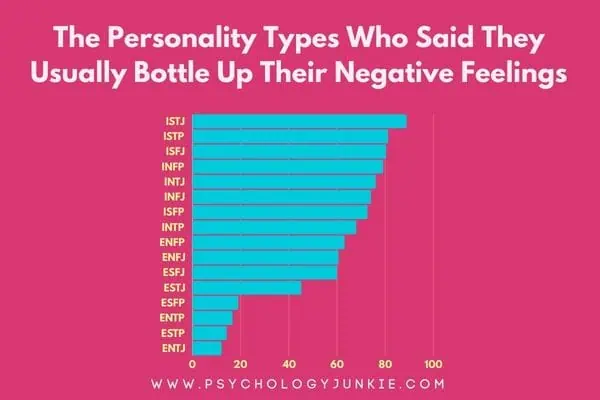The Myers-Briggs® Personality Types Most Likely to Bottle Up Their Feelings
Have you ever had one of those days where someone really is getting under your skin, but instead of saying anything, you just sit there simmering like a pot of water on low heat? Yeah, same. Bottling up feelings is one of those things we all do from time to time, but some personality types are practically masters of it. In a survey of over 80,000 people, we asked which types are most likely to stifle their emotions when they’re frustrated or overwhelmed by someone or something. If you’d like to add your voice to the survey, you can do to that here!
Unsurprisingly, some types—like ISTJs—excel in this department. But why? This article breaks down why these types tend to bottle up their emotions and how they can release the pressure in a healthy way. Let’s break it down.

Not sure what your personality type is? Take our personality questionnaire here. Or you can take the official MBTI® here.
The Myers-Briggs Personality Types Most Likely to Bottle Up Their Feelings

#1: ISTJs
ISTJs are the gold medalists of keeping it together…sometimes too much. 88.82% of ISTJs said they keep their feelings bottled up. They’re the type of people who will calmly fix a leaky pipe in the middle of a tornado while everyone else is running around panicking. Feelings, for ISTJs, can feel like an unproductive distraction. There are things to do, and emotions will only get in the way of those things! They’re all about order, logic, and calm composure. Emotions are unpredictable, volatile, and vulnerable. So, for ISTJs, they tend to take a backseat.
One ISTJ I worked with expressed their attitude towards emotions: “If I don’t talk about it, it’s like it’s not there. And if it’s not there, I can just get on with my day.” Another told me they avoid sharing feelings because it feels like a waste of time. “If I say I’m upset, then they’re going to want to talk about it, and then nothing actually gets fixed!” This tendency to prioritize solutions over emotional expression makes ISTJs seem calm and unshakable on the outside—but inside, they can feel isolated, like nobody truly understands them.
So what can ISTJs do to manage their feelings without bottling them up forever? Try these tips:
- Set aside quiet time. Get away from the noise, grab a notebook, and write down what you’re feeling. Seeing it on paper can help make sense of it.
- Find one trusted person. Maybe it’s your partner, best friend, or even your dog (we won’t judge). Practice sharing small frustrations first. “That meeting ran long and it threw off my schedule” is a start!
- Think of emotions like a clogged pipe. If you ignore it, it’s going to burst eventually. Releasing some pressure now is way better than dealing with a flood later.
- Remember: expressing emotions is productive. It can strengthen your relationships, prevent resentment, and keep you from carrying emotional baggage into the future.
Find out more about ISTJs: 10 Things You Crave Every Day as an ISTJ Personality Type
#2: ISTPs
ISTPs are the “fixers” of the personality world. 81.25% of them said that they bottle up their feelings most of the time. Got a computer virus you need help dispelling? An ISTP will have it figured out and cleared up before you even finish explaining the issue (sorry, ISTPs, I know you’re already your family’s tech support people). But emotions? That’s a trickier fix. For ISTPs, feelings are like a puzzle piece that doesn’t quite fit into their logical, pragmatic world. They’re more interested in thoughts than feelings, how things work than how people feel.
When an ISTP is annoyed, their instinct is to detach, analyze, and move on rather than dwell on the emotional side of things. Sharing their feelings often feels unnecessary or awkward—instead many search for distraction. I know one ISTP who goes for a drive anytime they’re upset, and another who takes off on a run. Movement and action seem to be a popular coping mechanism.
One ISTP I worked with told me, “I don’t really see the point in talking about feelings. Most of the time, I just need some space and I’ll be fine.” This emotional independence can make ISTPs seem unflappable, but it can also lead to frustration when others expect them to open up in ways that don’t feel natural to them.
If you’re an ISTP looking to manage bottled-up feelings, consider these tips:
- Channel your energy. When you’re frustrated, do something physical like fixing, building, or exercising. Sometimes action can help you process emotions without words.
- Experiment with small expressions. You don’t have to write poetry about your feelings, but you could say, “That really annoyed me,” or “I’m frustrated by this.” Keep it simple.
- Make time for solitude. ISTPs process best in their own space, so carve out time to step back and decompress.
- Remember: feelings are data, too. Just like troubleshooting a problem, emotions give you clues about what’s working and what’s not. Use them!
Find out more about ISTPs: The ISTP Ti-Ni Loop (What it is and How to Cope)
#3: ISFJs
ISFJs seek a life of tranquility and connection. Yet while they are often the go-to people for emotional support, they don’t tend to ask for it! 80.41% of them said they bottle up their feelings when they’re upset. They tend to think, “Why burden someone else with my problems when I can handle it myself?” Their nurturing nature means they prioritize other people’s emotions over their own, even when they’re feeling overwhelmed.
One ISFJ respondent said, “I’m terrified of confrontation or rocking the boat. Most of the time when I’m feeling annoyed or angry, if I really said what I felt I’d end up damaging relationships that are too important to me. So I just tell myself it’s not worth it to say anything.” This quiet self-sacrifice can lead to burnout and resentment if ISFJs don’t find healthy ways to share what they’re feeling.
Here are some tips for ISFJs to release bottled-up emotions:
- Practice journaling. Writing can help you clarify your feelings and recognize patterns in your emotions.
- Learn to say no. It’s okay to set boundaries and prioritize your well-being over pleasing everyone else.
- Start with small disclosures. Tell someone you trust, “I’m feeling a little overwhelmed lately,” and see how it feels to share.
- Remind yourself: your feelings matter. You’re not a burden. Taking care of yourself helps you be there for others, too.
Find out more about ISFJs: Diving Deep Into the ISFJ Personality Type
#4: INFPs
INFPs are deeply feeling, introspective individuals. They’re the type to write angsty poetry at midnight or create a painting that captures a nuanced facet of the human experience. But when it comes to their own personal frustrations, INFPs often keep things bottled up. In fact, 79.17% of INFPs said they bottle up their feelings when they’re annoyed or upset.
Why? As introverted feeling types, their emotions are deep and intensive. They’re internal. For the INFP, their feelings are their own business and it can feel like it’s cheapening them to blurt them out to just anyone. If they can’t find the perfect way to express their feelings (or the perfect person to express them to), they’ll often say nothing at all.
One INFP I spoke with described it well: “I feel things so deeply, but I worry that if I say what I’m feeling, it will come out wrong, and people will think I’m overreacting.” Another said they tend to “swallow” their feelings because they feel too personal. This can leave INFPs feeling stifled or like nobody truly understands them.
If you’re an INFP, try these strategies:
- Express through art. Whether it’s writing, painting, or music, creative outlets can help you process emotions.
- Recognize how the emotions feel in your body. Check in with your Chest, Arm, Legs, and Mouth (CALM) and notice how they feel. Do you need to stretch, rest, or shake things off?
- Challenge your inner critic. Ask yourself: “What’s the worst that could happen if I share this?” It’s often less scary than you think.
- Find a positive way to release emotions after processing them. Feelings are meant to share a particular message. Once you’ve found the message, written it down or spoken about it, then it’s time to let it go. Take some deep breaths, and as you do imagine your mind clearing away all the thoughts, worries, and frustrations. As you exhale, imagine each emotion melting out of your body and shake them off.
Learn more about INFPs: The Four Personality Types INFPs Clash with Most (and How to Connect)
#5: INTJs
INTJs are planners and problem-solvers, always thinking three steps ahead. For them, emotions can feel inconvenient—something to “deal with” once the mission is complete. In fact, 76.09% of INTJs said they bottle up their feelings when they are upset or annoyed.
When they’re frustrated, their natural tendency is to analyze the situation logically rather than dive into their emotional reactions. Sharing their feelings can feel unnecessary or even risky, especially if they doubt others will respond constructively.
As an INTJ myself, I definitely am affected by my emotions, but I tend to push them to the side while I focus on important tasks. Then I work on problem-solving or tackling a project so that I can feel more in control. But sometimes this means that I’ve harbored negative feelings for someone without taking steps to correct the situation. My suggestion? Express your frustration with someone in a conscientious way. It can help you to build bridges and avoid dealing with similar frustrations in the future!
I once worked with an INTJ who said, “I can’t stand wasting time on feelings that don’t solve anything. If I’m upset, I’d rather think my way out of it.” Another INTJ told me they avoid sharing emotions because it makes them feel vulnerable, which is a position they actively try to avoid. This preference for logic over emotion can make INTJs seem detached or even cold, but inside, they often long for someone who understands their inner world.
INTJs can benefit from these strategies to process bottled-up emotions:
- Schedule reflection time. Give yourself time to process emotions just like you’d schedule time for planning a project.
- Use logic to your advantage. Ask yourself, “What’s the logical benefit of expressing this feeling?” Often, the answer is clarity, connection, and course-correction in relationships.
- Start small. Practice saying things like, “That really annoyed me” or “I felt disappointed when that happened.”
- Take care of your physical self. As a dominant Introverted Intuitive, it can be easy for you to lose touch with your body and focus on intellectual tasks. But anger, annoyance, and stress live in your body. Take a moment to notice how your body feels; scanning each part for tension, restlessness, and discomfort. Then think of some ways to deal with the physical feelings. You might need to vent, shake your body, stretch, do some yoga, breathe.
Learn more about INTJs: The Dark Side of the INTJ Personality Type
#6: INFJs
INFJs are known for their depth and emotional insight—but when it comes to their own feelings? Those are often shoved into a box labeled “Deal With Later (Maybe).” In the survey, 74.07% of INFJs admitted to bottling up their emotions. Why? INFJs have a deep-seated desire to protect the harmony around them. They’ll often think, “If I express my anger, it’ll make everything worse. I’ll just deal with it on my own.” Unfortunately, this usually means they’re walking around with unresolved emotions that gnaw away at them like a cat stuck in a cabinet.
One INFJ I worked with said, “I can feel everyone’s emotions around me like a radar, but I’m terrified of dumping mine on anyone else. What if they can’t handle it?” Another INFJ told me they’ll rehearse exactly what they want to say, but when the moment comes, their words evaporate, leaving them smiling awkwardly and saying, “It’s fine. Don’t worry about it.” INFJs often feel misunderstood when they try to express themselves, which adds to their hesitation to open up.
Here’s how INFJs can let out those feelings without creating more frustration and confusion:
- Write a letter you won’t send. This gives you a safe way to vent without worrying about consequences. Pour out all the raw, unfiltered emotion—you might even surprise yourself with what comes up.
- Practice small moments of honesty. Say, “That hurt my feelings,” or “I didn’t like the way that was handled.” Practice expressing your feelings, but in short, simple sentences rather than feeling like you need to explain it all in detail.
- Find someone who “gets” you. Other deep feelers (like INFPs or ENFJs) often make great sounding boards.
- Remember: your feelings are valid. They don’t need to be perfect or universally understood to deserve expression.
Discover more about INFJs: The Four Personality Types INFJs Clash with Most (and How to Connect)
#7: ISFPs
ISFPs are deeply emotional but fiercely private. They don’t want anyone poking around in their feelings unless they’re explicitly invited—and even then, only on good days. In the survey, 72.72% of ISFPs said they bottle up their emotions. Why? For ISFPs, feelings are personal and intensive. They’re meant to be processed alone rather than blurted out to people who may not get it. They’ll think, “My feelings are mine. Why should I drag someone else into them?”
I know an ISFP who has the bad luck to deal with “advice-givers” every time she tries to talk about her feelings. Instead of listening, people jump in with a lot of “should’s” or “should not’s” rather than simply being present and trying to understand. ISFPs don’t need a lot of advice when they’re stressed; in fact, that can make things worse. They usually need space and time to process, and then IF they talk to someone it’s because they want to communicate their feelings, not because they want someone else to “solve” anything (unless they explicitly ask for that).
One ISFP respondent said, “If I express my feelings, people always try to ‘fix’ them. I don’t want advice.” Another ISFP said they prefer to process emotions through art—whether it’s painting, writing, or even just rearranging their room. For ISFPs, their emotions often come out in subtle, creative ways rather than direct conversations, which can leave others clueless about what’s really going on.
If you’re an ISFP, here’s how you can gently ease into emotional expression:
- Create something raw and honest. Paint a picture, write a poem, or even doodle your feelings. Expressing emotions creatively can help you process them without saying a word.
- Set boundaries with helpers. If someone tries to “fix” you when you’re venting, say, “Thanks, but I just need you to listen.”
- Write a feelings inventory. Jot down what you’re feeling and why, even if it’s just for your eyes.
- Share with someone safe. Whether it’s a therapist, a sibling, or a friend who gets you, try to prioritize sharing more intense and meaningful emotions with someone who understands you. Sharing your feelings helps you to bond, form connections, build trust, intimacy, and loyalty. It can also help you to see a problem in a new light!
Learn more about ISFPs: Understanding the ISFP Fi-Ni Loop
#8: INTPs
INTPs are logic-loving problem-solvers who treat emotions like an unsolvable equation. In the survey, 68% of INTPs said they bottle up their emotions—and honestly, they’re probably okay with that. For INTPs, feelings can feel irrational and messy, and they’d much rather focus on something they can quantify, like how many galaxies exist in the observable universe. When they’re annoyed, their go-to strategy is to detach, intellectualize, and file those pesky emotions away for “future review” (which may or may not ever happen).
One INTP I worked with laughed while describing their approach: “I’ll think, ‘Why am I feeling this way? And all I get is a jumbled mess of data, like static. So I try to move on to something else as fast as possible.’” Another said they feel awkward when expressing emotions because they don’t trust themselves to say it “right.” Instead, they distract themselves with a book, a documentary, or a random Wikipedia rabbit hole. While this method keeps them calm, it also means unresolved emotions can pile up like unwashed dishes in the sink.
Here’s how INTPs can approach emotions without short-circuiting:
- Analyze the emotion. Treat your feelings like a science project. Ask, “What triggered this? What’s the root cause?” Understanding the “why” can make emotions less overwhelming.
- Vent to yourself first. Try talking out loud or writing your feelings in a private note. Hearing or seeing your thoughts can make them feel more real.
- Schedule an “emotion check.” Take five minutes at the end of the day to ask yourself, “How do I feel right now?” (No, “meh” isn’t the only option!) You can even voice record it and then listen back to see if anything starts to make sense.
- Remember: emotions aren’t problems to solve. Sometimes they just need acknowledgment and acceptance to dissipate. Try naming them, recognizing how they feel in your body, listening to them (what truth are they revealing? What action are they calling for?) and then letting go.
#9: ENFPs
ENFPs are imaginative, enthusiastic, and endlessly curious—but when it comes to their own feelings, they can be surprisingly guarded. In the survey, 63.16% of ENFPs admitted to bottling up their emotions. Why? For ENFPs, feelings are personal and negative feelings can get in the way of new ideas and discovery. Instead of expressing their deeper feelings they might distract with a new possibility or try to organize a new, exciting project instead.
That said, ENFPs are extroverts and they are more likely to share their feelings than any introverted type. But here’s the thing: If you’re on the receiving end of an ENFP’s annoyance, try to be present and acknowledge how they feel. If you get defensive or combative it will only make things worse in the heat of the moment. If you ARE an ENFP, take a break from the crowd and get alone to process. Focus on naming the emotions, listening to them, and then identifying how they feel in your body. This process alone can help you gain insights into what’s really going on.
One ENFP I worked with said, “I’m always the happy one, so when I’m upset, I feel like I’m disappointing people.” Another shared how they’ll try to distract themselves by diving into new projects or hobbies, only to realize the feelings are still erupting in the background. ENFPs’ natural optimism can make them hesitant to dwell on negativity—but sometimes, you have to sit with the hard stuff to move past it.
Here’s how ENFPs can manage their emotions without losing their sparkle:
- Name it to tame it. Say your feelings out loud: “I’m frustrated because I feel misunderstood.” Naming the emotion can help you process it faster.
- Talk it out. Call a trusted friend or journal as if you’re having a conversation. Externalizing your thoughts can be cathartic.
- Avoid emotional multitasking. Don’t try to process feelings while juggling a dozen other things. Create space to focus solely on how you feel.
- Embrace your vulnerability. Being open about your feelings doesn’t make you “less fun”—it makes you real and relatable.
#10: ENFJs
ENFJs are all about connection, intimacy, and understanding. They focus on bringing people together, uplifting, and creating harmony. But when it comes to their own feelings? That can be a tricky area to tread. In the survey, 60.67% of ENFJs admitted to bottling up their emotions. Why? ENFJs don’t want to ruin the vibe or burden others with their problems.
“I want to talk about my feelings and I do sometimes,” one ENFJ said, “But it all depends on the person and the context. Many times I feel like it’s better if I just keep going because I’m going to create a whole new set of problems to solve if I talk about my frustration. Half the time I end up having to comfort the other person rather than get the help I need.”
Another ENFJ respondent admitted they often feel guilty for having negative emotions at all, as if their own struggles aren’t valid. This tendency to focus outward instead of inward can leave ENFJs feeling drained and underappreciated, even when they’re surrounded by people they’ve supported time and time again.
Here’s how ENFJs can process their emotions without feeling like they’re letting anyone down:
- Give yourself permission to feel. You don’t always have to be “on.” It’s okay to be upset, angry, or tired—it doesn’t make you any less amazing.
- Find someone who gives as much as you do. Vent to a person who actively listens and reciprocates your support.
- Create “me” time. Block off time in your schedule to journal, meditate, or even just scream into a pillow. (Yes, it helps!)
- Remember: self-care isn’t selfish. You can’t pour from an empty cup. Taking care of your feelings makes you stronger for yourself and others.
#11: ESFJs
ESFJs are the friends who will remember your birthday, bring you soup when you’re sick, and check in on you when you’re stressed. But what about their own emotions? In the survey, 60.01% of ESFJs said they bottle up their feelings. Why? ESFJs are hyper-aware of the emotional atmosphere and worry about upsetting the balance. They’ll think, “If I speak up, I’ll hurt someone or cause conflict—and that’s not worth it.” So often times they tuck their frustrations away and keep smiling, even if they’re boiling inside.
One ESFJ respondent explained it like this: “I don’t want to say something I’ll regret, so I just don’t say anything at all. By the time I figure out how to say it nicely, the moment has passed. I’m also a (Enneagram) 9 so I’m sure that has an impact.” While this tendency to bottle things up keeps relationships peaceful in the short term, it often leads to resentment or burnout over time.
Here’s how ESFJs can let those bottled-up feelings out without causing a storm:
- Start small. Say something like, “I felt overlooked when X happened.” You don’t need to dive into the deep end right away.
- Journal your thoughts. Writing them down can help you process and clarify what you’re feeling.
- Practice self-compassion. Remind yourself: you matter just as much as anyone else. Would you counsel a loved one to keep quiet? Probably not!
- Reframe confrontation. Instead of thinking, “I’m causing conflict,” tell yourself, “I’m creating clarity and building connection.” Bringing up problems can help you solve them in the long run.
Find out more about ESFJs: The Four Personality Types ESFJs Clash with Most (and How to Connect)
#12: ESTJs
ESTJs are all about objectivity, efficiency, and making sure things get done right (preferably the first time). So when it comes to emotions? They can feel like an interruption in the schedule. In the survey, 45.21% of ESTJs said they bottle up their feelings. ESTJs tend to see emotions as a private matter—they’re not something to broadcast to the world. If they’re upset, their instinct is to focus on fixing the problem rather than unpacking how it made them feel.
That said, for many ESTJs, fixing the problem does mean being direct with other people. If they’re annoyed at someone, they’re not ones to be passive-aggressive. Instead, they’re more likely to say directly “Cut it out” or “That’s causing a problem, stop.” But if their emotions don’t have an immediate solution? Then they’re likely to put them on the backburner.
Here’s an example: An ESTJ I know was frustrated with his workload. He’d work 12 hour days and come home to a messy house, his family watching television, and (sometimes) nothing to eat. He’d get angry and blow up about it, but he didn’t actually express how the situation made him feel. Instead, he started giving commands and trying to get people to pick up the mess. Unfortunately, this created more frustration because his family now thought he was being harsh.
Over time this made him feel more misunderstood, invalidated, and overwhelmed. He learned to keep his emotions inside because his anger only made things worse. In his situation, what he really felt was unloved or unappreciated for his hard work. But instead of sitting down and calmly expressing his underlying feelings, he’d say something like “You all are being so lazy! Get up off the couch! This house is a disaster!”
Getting into your feelings as an ESTJ can be overwhelming. After all, introverted feeling is your inferior function. It’s easier to focus on tasks and delegating. But sometimes this can mean a job gets done but your feelings are sidelined or neglected. Over time this can lead to damaged relationships, loneliness, and resentment.
Here are some ways to process emotions without sidelining them completely:
- Acknowledge the emotion. Ask yourself, “What am I feeling right now? Why?” Even a quick check-in can help. Instead of just focusing on the fact (“this house is a mess!”) focus on how the fact is making you feel (“I feel like nobody cares about what’s important to me”)
- Write it down. Jot down your feeling and the ‘why’ behind it.
- Vent constructively. Find someone you trust and frame it like a debrief: “Here’s what happened, and here’s how I’m feeling about it.” Try to speak calmly and without blame. Use “I feel” statements and affirm that you just want the other person to understand rather than get defensive.
- Give yourself a release. Punch a pillow, drive somewhere quiet and scream in the car, go somewhere private and stomp and throw a tantrum. Anger and annoyance create tension and restlessness, and it’s important to let that out in a manageable way!
#13: ESFPs
ESFPs are all about freedom of self-expression, so bottling up feelings isn’t really their thing. In fact, only 19.07% of ESFPs in the survey said they bottle up their feelings.
Why? ESFPs are wired to live in the moment, and that includes expressing what they’re feeling as it happens. If something’s bothering them, it’s likely to come out pretty quickly—whether it’s a heartfelt chat with a friend or a fiery “I can’t believe you just said that!” during an argument.
One ESFP I worked with laughed as they told me, “I don’t have a poker face. If I’m upset, everyone knows it. I might not always have the words to explain it, but you can definitely tell.” Another mentioned that they process emotions best through connection: “If I’m feeling down, I’ll call a friend or go out and do something fun. It helps me let go of it.” ESFPs have to be genuine, and keeping things in and pretending it’s all okay feels fake and disingenuous to them.
If you’re an ESFP, here are some tips to keep expressing yourself without letting emotions overwhelm you:
- Take a beat. Before reacting, ask yourself, “What’s really bothering me here?” Slowing down can help you respond thoughtfully rather than impulsively.
- Use physical outlets. Go for a walk, dance, or hit the gym when emotions feel too intense—movement helps you process them.
- Balance sharing. It’s great to express yourself, but make sure you’re giving yourself some time to process alone as well. Write your feelings down, breathe through them, and ask yourself what the lesson is in them.
- Celebrate your openness. Your ability to express feelings is a strength. Use it to build deeper, more meaningful connections.
Discover more about ESFPs: The ESFP and Grip Stress: What it is and How to Cope
#14: ENTPs
ENTPs are always about problem solving, and holding in annoyance tends to feel counter-productive to them. They’re likely to say “cut it out” or crack a joke to stop someone’s annoying behavior rather than quietly put up with it. Only 16.67% of ENTPs in the survey said they suppress their emotions, and that tracks. ENTPs are natural communicators, and they’ll often express emotions in a roundabout way, like tossing out a sarcastic comment or initiating a lively conversation about why someone’s behavior annoyed them.
One ENTP I worked with said, “I don’t really hold things in—it’s too much effort. If I’m upset, you’ll probably hear about it, but I might make it sound funny so it doesn’t get too heavy.” Another mentioned they process feelings by talking through them: “I’ll bounce ideas off a friend, even if it’s just a rant. I need to say it out loud to figure out what I actually think.” This open approach helps ENTPs avoid bottling up emotions, but it can sometimes leave others wondering how serious they are about what they’re feeling.
Here’s how ENTPs can manage emotions while keeping their signature flair:
- Get to the root. Ask yourself, “What’s the core issue here?” Humor is great, but digging deeper can help you resolve feelings more fully.
- Give yourself space. Take a moment to reflect privately—you might discover insights or solutions you’d otherwise miss.
- Keep being real. Your openness is a gift. Just make sure you’re balancing levity with honesty when it comes to your emotions.
#15: ESTPs
ESTPs are action-oriented, adventurous, and always ready to tackle the next challenge. Bottling up feelings? Not really their thing. Only 14.29% of ESTPs in the survey said they suppress their emotions. For ESTPs, emotions are just another part of life—when they feel something, they’re likely to express it in the moment. Whether it’s through a blunt comment, a quick joke, or a dramatic gesture, ESTPs don’t shy away from letting people know where they stand.
My husband is an ESTP and he tends to act on his frustration in the moment. If he’s annoyed at someone, they’ll know it, but this doesn’t mean he’s out of control. It’s key for Se-dominant (ESxPs) types to get a release for the immediate rush of adrenaline that frustration triggers. They may need to vent, punch a pillow, do 50 push-ups, or otherwise get out their physical and emotional energy when they’re mad.
Daniel (my husband) often needs to vent or go for a drive when he’s mad. When he’s venting, I’ve learned that he just needs me to listen rather than jump in with advice or logical input. Yes, ESTPs are thinking types, but they often have to express their emotions (Fe) when they’re upset, and then filter them through their analytical process (Ti). Once he’s blurted out his feelings his Introverted Thinking can kick into gear and sort out what makes sense and what isn’t accurate.
I asked him to explain it to me, and he said “ESTPs are very physically expressive types, and so they tend to act more impulsively because they’re more in tune with their physical reactions. Anger just manifests as one of those reactions. It’s not out of the intention to hurt anyone, it’s out of the desire to express how they feel. Because it’s impulsive, sometimes it can backfire or be more explosive than it’s meant to be, because they’re not thinking about the end result, just the immediacy of the anger. I’d advise ESTPs to engage their introverted thinking side to validate the accuracy of what they’re feeling, then that can help to staunch that flow of anger. Try to separate acting on your impulses and the adrenaline rush you’re experiencing from the truth of what you’re feeling so you don’t say things you regret.”
Here’s how ESTPs can handle emotions while keeping their boldness intact:
- Pause before reacting. Take a breath and ask yourself, “Are my emotions truthful and accurate, or do I just need a release?” Make sure to assess before casting blame or blowing up at someone. You may need to confront them, or you may need to blow off some steam or get a break.
- Channel emotions into solutions. Use your natural problem-solving skills to address what’s bothering you in a constructive way.
- Reflect in motion. Whether it’s walking, exercising, or working on a project, physical activity can help you process emotions without sitting still.
- Balance bluntness with empathy. Your honesty is refreshing, but consider how your words might land with others—kindness doesn’t dilute your point.
#16: ENTJs
ENTJs are strategic, driven, and laser-focused on achieving their goals. When it comes to anger and frustration, they don’t waste time. Only 12.16% of ENTJs in the survey said they bottle up annoyance, while most focus on addressing the problem immediately and fixing it.
One ENTJ I worked with summed it up perfectly: “If I’m upset, I’ll think, ‘Is this worth my time?’ If the answer is no, I move on. If the answer is yes, I confront the problem head-on” Another told me they’re selective about sharing emotions: “I’ll talk about it if it’s relevant to the situation. Otherwise, it’s not productive.”
My ENTJ father is extremely forthright in his anger (he is also an Enneagram 8, so that has an effect). His blunt approach tended to intimidate people, but overall it meant that he spent less time simmering about problems because he had a plan he was implementing to solve them.
At work his approach was generally effective. But in relationships it was trickier. People you love aren’t always as easy to direct and “fix” and I remember him frequently getting frustrated that in our family of six there were times when his assertive approach backfired. In contrast, my ISFJ mom would bottle up her anger and get passive-aggressive. This could create some pretty weird dynamics in our family; one parent blowing up and asserting their anger, and the other bottling it up and becoming passive-aggressive. In the end, this made my ENTJ dad feel like he couldn’t get a problem solved directly or hash it out with my mom, and my mom felt like he was just attacking her all the time and not considering her feelings.
Here’s the thing about ENTJs: If there’s a problem they want to solve it yesterday. If they’re annoyed, they’ll speak up if they think that will help. They’re not ones to shy away from confrontation most of the time. This doesn’t mean, however, that they’re trying to attack anyone or ruin anyone’s day. Usually they’re trying to find a fix, and sometimes they’re trying to understand. Yes, there are mean ENTJs who are just jerks about expressing criticism. But average to healthy ENTJs are usually just trying to get to a solution as quick as possible. Their Extraverted Thinking wants a quick, efficient result, and their Introverted Feeling function wants honesty.
Here are a few ways ENTJs can process emotions without feeling like it’s a waste of time:
- Schedule reflection time. Block off 15 minutes in your day to think about how you’re feeling—yes, emotions deserve a spot on your calendar.
- Focus on growth. Ask yourself, “What can I learn from this emotion?” Reframing it as data can make it more palatable.
- Open up selectively. Share your feelings with someone you trust, especially if they offer insights or perspectives you wouldn’t consider alone.
- Balance logic with intuition. Emotions are part of the big picture. Ignoring them could mean missing important cues for growth or connection.
Find out more about ENTJs: How ENTJs Say “I Love You”
What Do You Think?
Do you bottle up your feelings or express them? What tips or insights have you learned that you could share with other readers? We’d love to hear from you in the comments!
Explore more about your personality type in our eBooks, Discovering You: Unlocking the Power of Personality Type, The INFJ – Understanding the Mystic, and The INFP – Understanding the Dreamer. You can also connect with me via Facebook, Instagram, or Twitter!












As an INTP I try to pick and choose my battles, as I don’t want to be one of “those” people who picks a fight over every offense. Ideally I would wait until the same conflict has happened two or more times to call out the pattern, but by this point I might be so flustered that I just explode; and even if I can approach the issue calmly I might be dealing with someone who gaslights (“That’s your problem because…), responds with an “I didn’t say/do that” and/or is quicker on their feet than I, who might cite reasons a, b and c why they’re right and I’m wrong. And so I end up internalizing and even avoiding the person altogether, and at the same time analyzing what I might have done wrong and how to avoid the situation in the future. Emotions are very much involved but revealing them might well be like handing the person a dagger and showing them where to stick it.
It might be true that the more introverted you are, the more you bottle up your feelings. I’m very introverted, and I almost always keep my thoughts and feelings to myself. Voicing them usually creates problems.